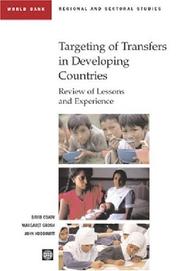| Listing 21 - 26 of 26 | << page >> |
Sort by
|
Book
Year: 2004 Publisher: [Washington, D.C.] : International Food Policy Research Institute
Abstract | Keywords | Export | Availability | Bookmark
 Loading...
Loading...Choose an application
- Reference Manager
- EndNote
- RefWorks (Direct export to RefWorks)
Nutrition --- Food supply
Book
Year: 2021 Publisher: Washington, D.C. : The World Bank,
Abstract | Keywords | Export | Availability | Bookmark
 Loading...
Loading...Choose an application
- Reference Manager
- EndNote
- RefWorks (Direct export to RefWorks)
The COVID-19 pandemic has spurred interest in the use of remote data collection techniques, including phone surveys, in developing country contexts. This interest has sparked new methodological work focusing on the advantages and disadvantages of different forms of remote data collection, the use of incentives to increase response rates, and how to address sample representativeness. By contrast, attention given to associated response fatigue and its implications remains limited. This study designed and implemented an experiment that randomized the placement of a survey module on women's dietary diversity in the survey instrument. The study also examines potential differential vulnerabilities to fatigue across food groups and respondents. The findings show that delaying the timing of mothers' food consumption module by 15 minutes leads to 8-17 percent decrease in the dietary diversity score and a 28 percent decrease in the number of mothers who consumed a minimum of four dietary groups. This is driven by underreporting of infrequently consumed foods; the experimentally induced delay in the timing of mothers' food consumption module led to decreases of 40 and 11 percent in the reporting of consumption of animal source foods and fruits and vegetables, respectively. The results are robust to changes in model specification and pass falsification tests. Responses by older and less educated mothers and those from larger households are more vulnerable to measurement error due to fatigue.
Coronavirus --- COVID-19 --- Demographic --- Dietary Diversity --- Disease Control and Prevention --- Health Survey --- Health, Nutrition and Population --- Nutrition --- Phone Survey --- Poverty Monitoring and Analysis --- Poverty Reduction --- Response Fatigue
Book
Year: 2020 Publisher: Washington, D.C. : The World Bank,
Abstract | Keywords | Export | Availability | Bookmark
 Loading...
Loading...Choose an application
- Reference Manager
- EndNote
- RefWorks (Direct export to RefWorks)
This paper assesses the impact of Ethiopia's flagship social protection program, the Productive Safety Net Program on the adverse impacts of the COVID-19 pandemic on the food and nutrition security of households, mothers, and children. The analysis uses pre-pandemic, in-person household survey data and a post-pandemic phone survey. Two-thirds of the respondents reported that their incomes had fallen after the pandemic began, and almost half reported that their ability to satisfy their food needs had worsened. Employing a household fixed effects difference-in-difference approach, the study finds that household food insecurity increased by 11.7 percentage points and the size of the food gap by 0.47 months in the aftermath of the onset of the pandemic. Participation in the Productive Safety Net Program offsets virtually all of this adverse change - the likelihood of becoming food insecure increased by only 2.4 percentage points for Productive Safety Net Program households and the duration of the food gap increased by only 0.13 month. The protective role of the program is greater for poorer households and those living in remote areas. The results are robust to various definitions of program participation, different estimators, and different ways of accounting for the non-randomness of mobile phone ownership. Productive Safety Net Program participants were less likely to reduce expenditures on health and education by 7.7 percentage points and less likely to reduce expenditures on agricultural inputs by 13 percentage points. By contrast, mothers' and children's diets changed little, despite some changes in the composition of diets, with consumption of animal source foods declining significantly.
Agriculture --- Coronavirus --- COVID-19 --- Diet Diversity --- Food Gap --- Food Security --- Health, Nutrition and Population --- Nutrition --- Pandemic Response --- Poverty Reduction --- PSNP --- Safety Nets --- Safety Nets and Transfers --- Services and Transfers to Poor --- Social Protection --- Social Protections and Assistance

ISBN: 0821357697 9786610085613 1280085614 1417543868 Year: 2004 Publisher: Washington, D.C. : World Bank,
Abstract | Keywords | Export | Availability | Bookmark
 Loading...
Loading...Choose an application
- Reference Manager
- EndNote
- RefWorks (Direct export to RefWorks)
Development aid. Development cooperation --- Economic assistance, Domestic --- Poverty --- Anti-poverty programs --- Government economic assistance --- Economic policy --- National service --- Grants-in-aid --- Developing countries --- Economic conditions.
Book

ISBN: 9780812208610 Year: 2013 Publisher: Philadelphia
Abstract | Keywords | Export | Availability | Bookmark
 Loading...
Loading...Choose an application
- Reference Manager
- EndNote
- RefWorks (Direct export to RefWorks)
Book

ISBN: 9780812207873 Year: 2012 Publisher: Philadelphia
Abstract | Keywords | Export | Availability | Bookmark
 Loading...
Loading...Choose an application
- Reference Manager
- EndNote
- RefWorks (Direct export to RefWorks)
| Listing 21 - 26 of 26 | << page >> |
Sort by
|

 Search
Search Feedback
Feedback About
About Help
Help News
News